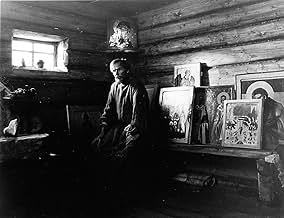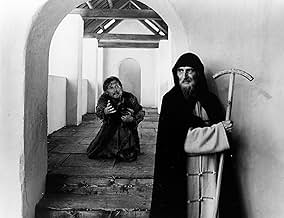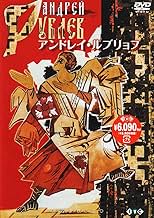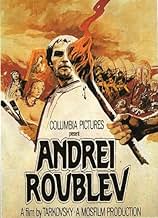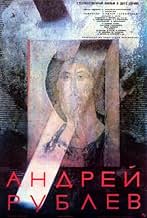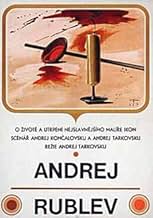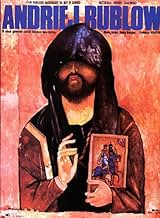La vie et les afflictions de l'iconographe russe du XVe siècle Saint Andrei Roublev.La vie et les afflictions de l'iconographe russe du XVe siècle Saint Andrei Roublev.La vie et les afflictions de l'iconographe russe du XVe siècle Saint Andrei Roublev.
- Director
- Writers
- Stars
- Prix
- 4 victoires et 1 nomination au total
- Durochka
- (as Irma Raush)
- Patrikey, monakh
- (as Yu. Nikulin)
- Skomorokh
- (as R. Bykov)
- Stepan, sotnik Velikogo knyazya
- (as N. Grabbe)
- Foma, monakh
- (as M. Kononov)
- Starshiy liteyshchik
- (as S. Krylov)
- Tatarskiy khan
- (as B. Beyshenaliev)
- Aleksey, monakh
- (as A. Obukhov)
- Sergey
- (as Volodya Titov)
- Efim
- (as N. Glazkov)
Avis en vedette
But there is another thread, one that eschews selfaware structure -- where idea is anathema. Nature is celebrated. Rich intuition and meditative spontaneity are sufficiently nutritious in some hands, but these are amazingly few. The so-called 'new wave' tried it, at least initially. Lots of other appearances as well, mostly failures, some lovely. Among the attempts, I know of only two filmmakers who have mastered this tricky approach of avoiding knowledge: Tarkovsky and Malick. Of these, Malick is more abstractly sensual.
After all, Tarkovsky must deal with that dark cloth of Russian self-pity, that tradition of grand themes and epic fate, something which does not burden Malick. So the metaphoric content is heavy. That's fine, an acceptable skeleton for a nearly three hour meditation. All is self-referential: a set of images about an imagemaker: the actor's wife played the retarded girl who factors so importantly. During the production he was cheating on her with who was to become his second wife. The girl goes off with a Tartar, leaving Rublev. Many other scenes refer to Rublev's situation, resolved by Tarkovsky's action. For instance, we have a sequence where Rublev hesitates to paint a scene of fateful pain. This is followed by Tarkovsky doing just that. The extension of metaphor among parts of the film (ballooner and bellringer to Rublev's story) extends from the film to the filmmaker and thence from him to us.
What I found even more interesting was his confidence in complex compositions and long, long multiperspective tracking shots. Compared to other swoopers, this camera seems curious, impetuous, not at all as if the shots were planned. Hard to believe it is only his second feature. This alone expands one's imagination with only a couple viewings, but combined with the notion of folded metaphor (including visual metaphor) it becomes a truly great and singular work.
(Some classical symmetries touch multiple places: a jester within the play; solitude in the context of relationship; creating in the unknown; broken symmetry through one twin killing another. Some new ones: pagan fire and water underlying ritual exuberance, either sex or religious art.)
Alas, the DVD has a discouragingly vapid commentary. But then I guess that's the whole point, and with the loss of potatohead Soviets, we need to substitute the next best thing.
Fortunately for us, this movie, recently rereleased in a DVD transferred from a pristine 35mm print, may now be viewed intact, and it is one of the great triumphs of mankind's stay on the planet. It is a masterpiece almost without flaw. The beautiful painterly images follow one another in breathtaking succession. At least three of the eight chapters, if taken individually, could stand alone as separate masterpieces.
The ostensible subject is the life of Andrei Rublev, a 15th century monk who is renowned as Russia's greatest creator of religious icons and frescoes. Rublev himself, however, is merely a useful device. Little is known about him, and most of the episodes in the movie come straight from Tarkovsky's imagination of what might have been. Sometimes one must ignore the facts to get to the truth.
The movie is not about one talented monk, but about Russia, and Rublev stands in as a useful symbol since he lived in a time when he could personally witness two of the key elements in the development of Russia's unique culture: the growing force of Byzantine Christianity, and the Mongol-Tatar invasions. In addition he was an artist and a thinker, and experienced first-hand the difficulty of following those paths in Russia. Rublev's own inner conflicts allow the filmmaker to illuminate thoughts on the pagan and the sacred, the nature of art, the relationship of the artist to the state, what it means to be Russian, and what it means to be human.
It is beautiful, mystical, and profound, but the truly inspiring aesthetics are matched with complete technical wizardry. I simply don't know how some of the shots were created. One I do understand, and stand in awe of, is a continuous single camera shot, just before the church door is breached by Tatar invaders, which involves action in several different locations at multiple elevations as well as the correct timing of hundreds of extras and horses. It makes the first scene of Touch of Evil look like a high school film project.
It is a difficult movie to follow. One might liken it to James Joyce's Finnegan's Wake as a work of genius so monumental and complex, and so disdainful of traditional narrative form, that it requires extensive thought and study to understand it. And even after studying it, watching it repeatedly, and reading Tarkovsky's own comments about it, one still finds it opaque in many ways.
Tarkovsky was free to create the work of art he wanted, without concern for profit. The original 205 minute cut was also free from outside censorship. He used this freedom to realize his personal artistic vision. There is no other movie like it, and there may never be. Score it 11 out of 10.
A bit difficult to review this movie. It is clearly the work of a master craftsman: the exquisite cinematography, the sheer scale of the subject matter and time period, the themes, the obvious adoration director Andrei Tarkovsky has for his subject.
Yet it is often quite a grind to watch: clocks in at well over 3 hours and moves very slowly. Several scenes will go by without development in plot or theme. Furthermore, the separate time periods don't necessarily form a narrative. They often just feel like things happening, with no connection between them.
While acknowledging that the film is well made, I fail to see how it is so highly regarded. I did not come away feeling that I had just watched a masterpiece, something incredibly profound or moving.
Andrei Tarkovsky released his first feature-length film, 'Ivan's Childhood,' in 1962. Even prior to its release, the director had already expressed interest in filming the life of great Russian iconographer Andrei Rublev, even though very little is actually known about his life. Working with a screenplay written by himself and Andrei Konchalovsky, Tarkvosky began filming in 1964, and a 205-minute cut was screened for a private audience in Moscow in 1966. The critical response, however, was mixed, and sizeable cuts were made to the film's running time, before a 186-minute version screened out of competition at the Cannes Film Festival in 1969. I'm not entirely sure which version I ended up watching; the time counter indicated somewhere around 165 minutes, though my brief research couldn't uncover any major missing sequences. In hindsight, I should probably have held out for longer and acquired the Criterion Collection DVD, which restores the picture to its four-hour glory. In several years' time, when I inevitably decide to revisit Tarkovsky's film, I'll make certain to do just that.
'Andrei Rublev' is divided into nine distinct segments, including a colour epilogue displaying Rublev's weathered icons as they exist today. They each explore a facet of the great painter's life, placing particular emphasis on his faith in God and how it relates to his work on frescos and icons. Interestingly, though Rublev (Anatoli Solonitsyn) himself appears in most of the stories, he is often hidden in the background, a passive observer on the behaviour of others, including Kirill (Ivan Lapikov), who is jealous of Rublev's recognition, and young Boriska (Nikolai Burlyayev), who successfully casts a bell using faith rather than knowledge. One consequence of this narrative format is a lack of cohesiveness in Tarkovsky's storytelling. We adequately follow the plot of each segment, but, as the whole, the film doesn't seem to build towards any notable climactic revelation the completed film is equal to the sum of its parts, which is still very impressive, but pulls it short of being a masterpiece. Once again, however, I must acknowledge that the 205-minute version may potentially correct this problem.
One statement that can not be disputed, however, is that 'Andrei Rublev' really is a beautiful piece of film-making. Vadim Yusov's black-and-white photography captures the exquisite delicateness of nature with almost heartbreaking intricacy; even the raindrops of a midday shower are imbued with the gentle elegance of the Heaven from which they ostensibly fell. Tarkovsky finds simple beauty in the quiver of a tree branch in the breeze, the leisurely flow of a river, herds of livestock fleeing from an aerial balloon. In portraying the complete opposite, the destruction of nature, the director is capable but not quite the master he is otherwise. The raiding of Vladimir by a troop of Tatars was obviously supposed to be the centrepiece of the picture, but Tarkovsky underplays every detail to such an extent that his "chaos" ultimately winds down into a staged conflict. Compare this sequence with Sergei Bondarchuk's burning of Moscow in 'War and Peace (1967),' in which one feels as though he has descended into the fires of Hell, and the contrast is telling.
Le saviez-vous
- AnecdotesFilm debut of Anatoliy Solonitsyn, and the first of four movies he made together with director Andrei Tarkovsky before his death from cancer in 1982. Had Solonitsyn lived, he would also have played protagonist Andrei Gorchakov in Tarkovsky's Nostalghia (1983), as well as star in a project titled 'The Witch' which eventually became Tarkovsky's final production, Le sacrifice (1986).
- GaffesThe smoothly-cut logs that feature many times in the early scenes are clearly cut with machinery not available in the early fifteenth century.
- Citations
Andrei Rublyov: You just spoke of Jesus. Perhaps he was born and crucified to reconcile God and man. Jesus came from God, so he is all-powerful. And if He died on the cross it was predetermined and His crucifixion and death were God's will. That would have aroused hatred not in those that crucified him but in those that loved him if they had been near him at that moment, because they loved him as a man only. But if He, of His own will, left them, He displayed injustice, or even cruelty. Maybe those who crucified him loved him because they helped in this divine plan.
- Autres versionsSoviet television created a severely trimmed 101-minute version that the director did not authorize. Notable scenes removed from this version were the raid of the Tatars and the scene showing naked pagans. The epilogue showing details of Andrei Rublev's icons was in black and white as the Soviet Union had not yet fully transitioned to color TV.
- ConnexionsEdited into Ombres vives ...une autre histoire du cinema... (2013)
Meilleurs choix
- How long is Andrei Rublev?Propulsé par Alexa
Détails
- Date de sortie
- Pays d’origine
- Langues
- Aussi connu sous le nom de
- Andrei Rublev
- Lieux de tournage
- sociétés de production
- Consultez plus de crédits d'entreprise sur IMDbPro
Box-office
- Budget
- 1 000 000 RUR (estimation)
- Brut – États-Unis et Canada
- 124 189 $ US
- Fin de semaine d'ouverture – États-Unis et Canada
- 11 537 $ US
- 15 sept. 2002
- Brut – à l'échelle mondiale
- 180 956 $ US
- Durée
- 3h 9m(189 min)
- Couleur
- Mixage
- Rapport de forme
- 2.35 : 1


